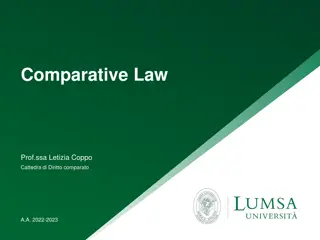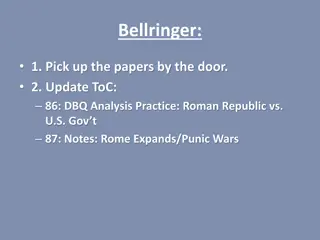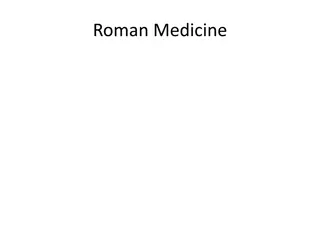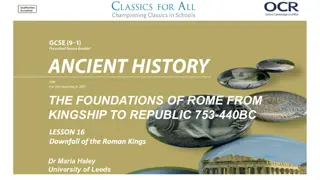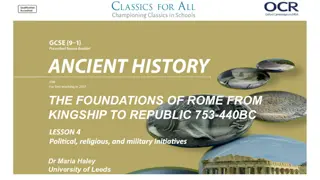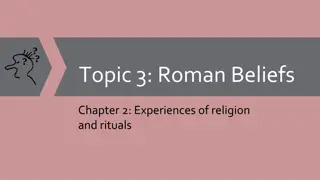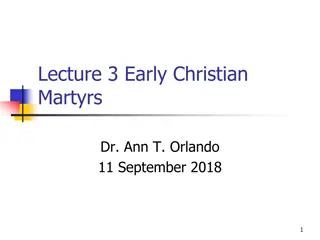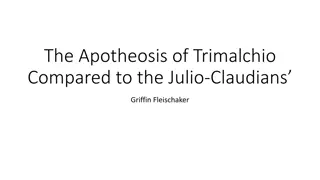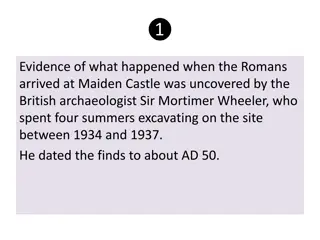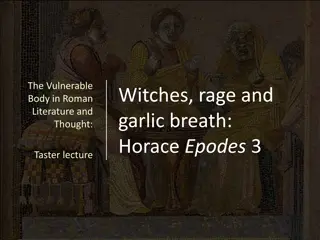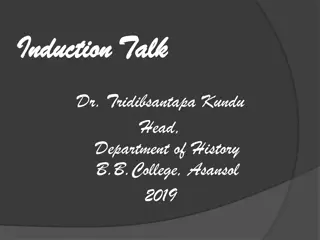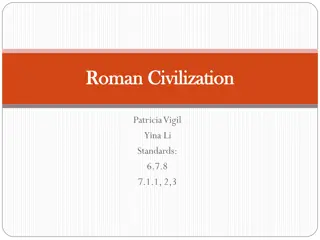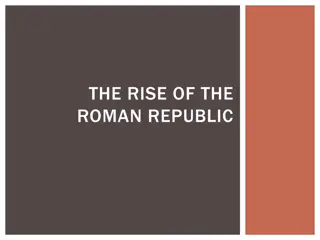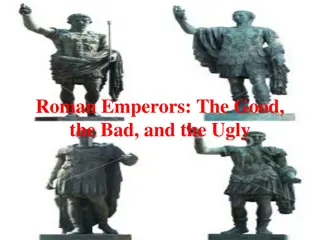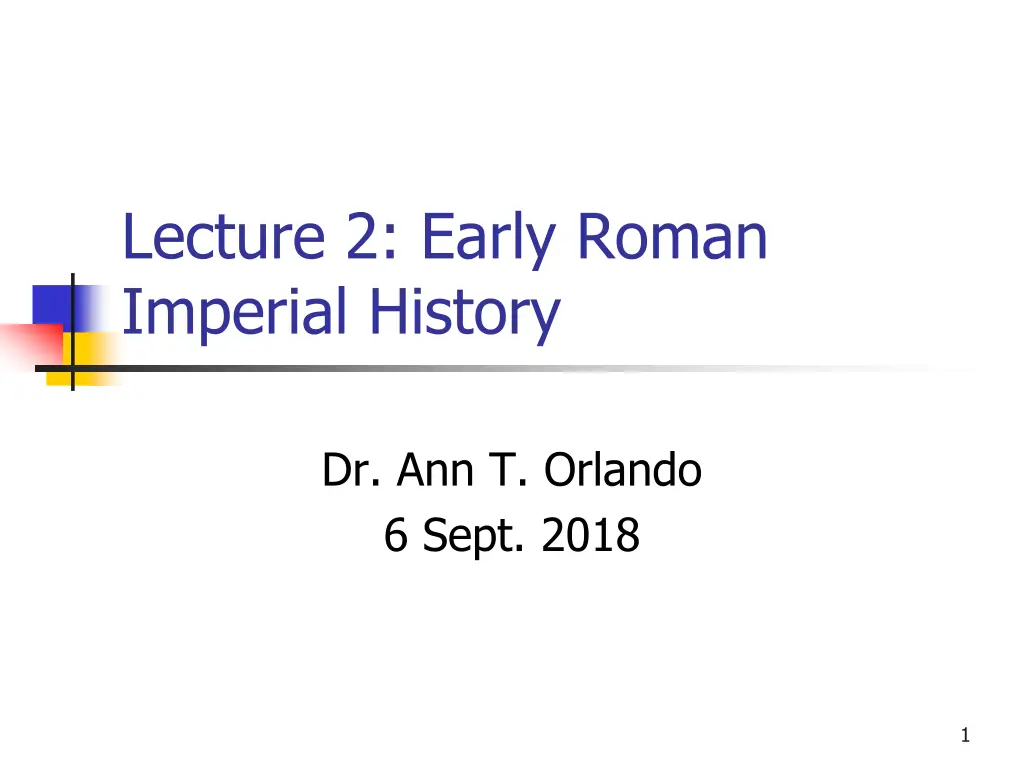
Early Roman Imperial History: Augustine of Hippo and Political Context
Explore the early Roman imperial history through the lens of Augustine of Hippo, a prominent Christian theologian, and delve into the political and military situations of the 4th century. Uncover the establishment of the Roman Empire, the role of Rome in the New Testament, and the division of the empire between East and West. Learn about key historical events and figures like Alexander the Great, while considering the theological layers of history as discussed by Dr. Ann T. Orlando.
Download Presentation

Please find below an Image/Link to download the presentation.
The content on the website is provided AS IS for your information and personal use only. It may not be sold, licensed, or shared on other websites without obtaining consent from the author. If you encounter any issues during the download, it is possible that the publisher has removed the file from their server.
You are allowed to download the files provided on this website for personal or commercial use, subject to the condition that they are used lawfully. All files are the property of their respective owners.
The content on the website is provided AS IS for your information and personal use only. It may not be sold, licensed, or shared on other websites without obtaining consent from the author.
E N D
Presentation Transcript
Lecture 2: Early Roman Imperial History Dr. Ann T. Orlando 6 Sept. 2018 1
Introduction Study of History and Augustine Alexander the Great and Greek kingdoms Establishment of Roman Empire History in New Testament Two cities, and was Rome ever a commonwealth? 2
History as part of Theology History has several layers 1. Facts of what happened when Jesus of Nazareth crucified c. 33 AD 2. Proximate causes Roman imperial concerns about Jewish insurgents Jewish priestly class (Sadducees) concern about renegade Jewish sects upsetting their relation with Romans 3. Secular historical result New religion 4. Providence Salvation for mankind Secular historians are generally concerned with 1 and 2, maybe 3. We are concerned with 1-4 3
Our Guide in First Part of Course: Augustine of Hippo The greatest western Christian theologian First to think deeply and systematically about Christian history Providence Plan of salvation in history 4
Brief Biographical Sketch Born near Carthage in 354 to a devoutly Catholic mother (St. Monica) and worldly father (Patrick) In youth leads a life of pleasure searching for happiness Flirts with Manichaeism (11 years) Becomes enamored with Platonism (really neoPlatonism) Conversion to Catholic Christianity and is baptized Ordained priest 391, bishop of Hippo 395 Died on 28 August 430 (now celebrated as his feast day) Peter Brown s book Augustine of Hippo remains the most important biography of Augustine in English Be sure to get the New Edition with Epilogue Discusses discovery of 12 previously unstudied letters and sermons of Augustine (396-404) 5
Political and Military Situation At beginning of 4th Century, Empire united under Diocletian and Constantine Throughout 4th Century civil wars among Constantine s sons and successors Theodosius the Great reunites the Empire Last Emperor of entire Roman Empire Barbarian invasions begin in West late 4th C, key moment is sack of Rome in 410 Empire become divided East (capital, Constantinople) and West (capital, Rome and Milan) Western Roman Empire ceases to exist 476 Eastern Roman Empire ceases to exist 1453 6
The Sack of Rome Sack of Rome in 410 to Alaric had a huge psychological impact The Goths sacking Rome were Arian Christians My voice sticks in my throat, and as I dictate, sobs choke my utterance. The City which had taken the whole world, was itself taken. St. Jerome Augustine dies as the Vandals (Arians) are besieging Hippo Vandal conquest of North Africa leads to destruction of Donatists City of God against the Pagans Augustine s efforts to explain history and refute criticism of Christianity 7
Augustine Over-Arching View of Church Man as a naturally social, not political being Love, not justice, should be the dominant virtue in the good society Before the Fall, there was no hierarchy of dominance; Slavery is a result of sin Political governments (of any type) are needed because of sin Mixed good and bad (wheat and tares) in Church Church mixed with society (city of man) Church as the City of God Exists as a pilgrim society traveling throughout human history (time) Exists permanently as a timeless, joyful community in eternity 8
Augustine: What is the Church When did it begin: with Abel Cain founder of city of man Abel, first member of City of God; proto priest and martyr Noah s ark as the City of God Holy man is a shepherd, not a king The Church can be said to begin in the OT due to the action of the Holy Spirit 9
Augustine: Pilgrim People People of God, the Church, are not members of city of man Sojoiners (like Abel) That is, Pilgrims Pilgrimage as a way of life For individuals For Church Social enterprise We travel together We support each other Everyone belongs to one of two cities City of God, the Church, on pilgrimage City of this world CoG I 10
What is a Pilgrim? Pilgrim, or peregrinus, is not so much a traveler, as a resident foreigner From 3rd C on, peregrinus was an order or class in the Roman Empire Before the 3rd C most residents of the Empire were peregrini Only in 3rd C were most residents given Roman citizenship 11
Translations of City of God Marcus Dods, Modern Library (1886) Henry Bettenson, Penguin (1943) R. W. Dyson, Cambridge (1998) William Babcock, New City Press, 2 vol. (2013) A good commentary is Gerard O Daly, Augustine's City of God, A Reader s Guide, Oxford: Oxford University Press, 1999. 12
Writing The City of God Begun in 412, addressed to Marcellinus A Roman official in Carthage, engaged in settling dispute between Catholics and Donatists Marcellinus wrote to Augustine in 411 (Letter 136.3): I beg in answer to all these objections you compose books that will be of extraordinary benefit to the Church, especially at this time. Augustine responded with Letter 137, promising to do so Augustine completes this great and arduous work in 427 During the writing of CoG, the Pelagian controversy was at its peak NB Augustine wrote more than half of his other works while he was writing CoG Marcellinus did not see the completion, he died in 413 Sometimes considered a saint and martyr because he was executed as a result of a Donatist plot against him 13
Outline City of God (De Civitate Dei) Augustine himself gives us the outline of the work (from Revisions 2.43) 22 Books, in 2 Parts Part I, arguments against the pagans Books I-V refutes those who want human affairs to prosper Books VI-X responds to those who acknowledge that these evils have been wanting Part II, the two cities of God and man, and the relation between them, the truth of the Christian faith Books XI-XIV deal with the origin of the two cities Books XV-XVII their development or trajectory Books XIX-XXII their merited ends And so, although all twenty-two books were written about both cities, they nonetheless took their title from the better one, The City of God. NB: Subdivisions of books into chapters were the work of later editors, as were most of the summaries before the Books. NB: Refer to CoG by Book.Chapter 14
Roman Imperial History Before Augustine and Sack of Rome Alexander the Great Rise of Roman Republic Roman Empire Rome and Palestine 15
Alexander the Great and Greek Kingdoms Alexander the Great (356-323 BC) Son of Philip of Macedonia; Student of Aristotle Conquers the world by age of 33 Founds Alexandria, Egypt center of learning for next 600 years Dies in 323 BC; leaving his generals in charge of various parts of his conquests Hellenistic (Greek) Empires 323 31 BCE Macedonians: Greece, Sicily, southern Italy Seleucids: Asia Minor, Syria and Mesopotamia Ptolemies: Egypt and Cyrene As a result of this extended period of Greek rule, the lingua franca of the Mediterranean was Greek from the 4th C BC until the 5th C AD in the West and the 15th C in the East Israel between two major competing Empires: Seleucid and Ptolemy 16
Map of Conquests of Alexander Great http://library.thinkquest.org/10805/alexmap.html 17
Persia First Persian Empire, Achaemenid, 550-330 BC Founded by King Cyrus the Great who defeats the Babylonians who allows Jews to return to Jerusalem (see Ezra and Nehemiah) Development of Zoroastrianism Defeated by Alexander the Great Second Persian Empire, Parthia, 250 BC 224 AD Earliest enemies were Seleucids (Greek Kingdom from Alexander the great) Cult of Mithras developed Then in conflict with Rome Rome very successful against Parthia in 2nd C AD, leading to over-throw of Parthians in civil war with the Sassanids Third Persian Empire, Sassanian, 224 AD 651AD Very successful against Romans In 253 Sassanid Shah Shapur captured Roman Emperor Valerian; made him his footstool. Then had him executed, stuffed and put on display. In 363 Julian the Apostate killed by Persians in battle Manichaeism established c. 250 AD (Mani killed by Persians as apostate from Zoroastrianism) 18
Rome Traditional founding date of 753 BC Brothers Romulus and Remus Started as a Republic ruled by Senate Two Punic Wars, Rome conquers and destroys Carthage 202 BC Rome becomes dominant power in Western Mediterranean Maccabees ask Rome for help against Seleucids 160 BC Julius Caesar conquers Gaul 80 BC Octavian defeats Anthony and Cleopatra (last Ptolemy ruler of Egypt) at Actium in 31 BC; Roman Empire established Roman Empire existed in some form between 31 BC and 1453 AD 19
Hellenism The dominance of Greek language, learning, philosophy, culture in Mediterranean Begins with Alexander the Great Ends with rise of Islam (Latin and Arabic replace Greek) Dominance is bolstered by Roman imperial power Jewish response Complete rejection by orthodox Judaism Complete assimilation by Alexandrian and Greek Jews Orthodox Christianity will completely assimilate Hellenism See Benedict XVI Regensburg Speech 12 Sept. 2006 21
Roman Society Roman religion was a public, civic obligation; NOT a way to have a personal relationship with Divine mystery religions became very popular in 1st through 3rd Century Roman Society (Cults of Mithra; Isis and Osiris; Dionysius) Anyone who did not offer sacrifice for the good of the state was considered an atheist Roman Emperor increasingly was a general who was adopted by current Emperor (Octavian Augustus adopted by Julius Caesar). Cult of Roman Emperor as god in his lifetime was started by Nero Roman household was composed of patron (father) and clients (wife, children, slaves, business associates dependent upon him) Father had complete control of clients Adoption was very common Owning property was far more prestigious than commerce Excellent road and mail system throughout the Empire Note that the most Latin (least Greek) part of the Empire was North Africa 22
Importance of Battle of Actium Before Octavius Augustus, Rome was a Republic ruled by Senate Octavius was the adopted son of Julius Caesar After Battle of Actium (31 BC) Octavius Augustus becomes emperor and dictator. His descendents will rule Roman Empire until the murder of Nero (68 AD) Battle of Actium also marks end of Ptolemais in Egypt Cleopatra last Ptolemy Tried to maintain her rule in Egypt first by being consort of Julius Caesar, then Mark Antony Cleopatra commits suicide after Battle of Actium is lost 23
First Century Roman Emperors Julio-Claudian Emperors (31 BC to 68 AD) Starts with Augustus, ends with Nero s suicide Consolidation of Empire won by Augustus Succession hereditary; intra-family rivalries, often deadly After Augustus, increasingly demonic emperors; Nero worst of all (read I,Claudius for a fictionalized but accurate account) Flavian Emperors (Vespasian and his sons Titus and Domitian) Destruction of Jerusalem Temple, 70 Vespasian built the Coliseum Domitian was particularly ruthless against enemies, real and imagined NB Nero and Domitian were the only emperors that the Senate of Rome did not declare gods 24
Herod the Great (73 to 4 BC) His father, Antipater, was placed in power by Romans Herod grew up ( hostage ) in Rome Friend with both Octavian and Antony Becomes client king of Romans Exerts great power in Palestine, including massive building projects Second Temple precinct Cities of Caesarea and Tiberius Palaces in Jerusalem, Masada When he dies, Romans divide his kingdom among his sons with a Roman administrator 25
Brief History of First Century AD Roman Provence of Palestine Friction among Herod s sons (Herod Anipater, Herod Antipas, Archelaus) Friction among various Jewish groups over relation with Rome Priests and aristocracy in Jerusalem Pharisees Essenes Zealots Frictions make Palestine a contentious place, with several localized tax rebellions One major First Century War: First Jewish War 66 73 AD Starts in Galilee, but spreads throughout Palestine Nero appoints Vespasian and his son Titus as Roman generals Destruction of Second Temple in 70 AD Fall of Masada in 73 AD 26
Luke: History of Church in New Testament Paul s disciple, Luke, writes an ordered account in two Books, the Gospel and Acts of the Apostles Written in an ancient historical style; Some important historical references in Luke Note references to Herod the Great and Augustus; Luke 1 and 2 Prophesy of destruction of Temple; Luke 19:41-44, 21:20-24 Jesus condemned for political insurrection; Luke 23:1-4 Some important historical references in Acts Pentecost, the birthday of Church; Acts 2 Reference to St. Stephen and the Hellenists; Acts 6-7 Council of Jerusalem in which Paul s position that Gentiles do not need to convert to Judaism is affirmed; Acts 15 Paul arguing with Athenian philosophers; Acts 17:16-33 Story of how the Church was spread by Paul s missionary activity to the ends of the earth (i.e., Rome) 27
Assignment Hitchcock, Chapter 1 CoG I.1, XIV.25-28, City of God and City of Man CoG, XV.5: Cain as the founder of city of man CoG, XIX.21, 24-28: Was Rome ever a true commonwealth? Augustine, Letter 1A* Written to Firmus in Carthage after Augustien finished writing CoG Suggests that Firmus divide CoG into 2 Volumes )I-X and (XI-XXII) Suggests he re-read many sections with perseverance 28

![Read⚡ebook✔[PDF] Blood of the Provinces: The Roman Auxila and the Making of Pro](/thumb/20539/read-ebook-pdf-blood-of-the-provinces-the-roman-auxila-and-the-making-of-pro.jpg)
![READ⚡[PDF]✔ European Mail Armour: Ringed Battle Shirts from the Iron Age, Roman](/thumb/20552/read-pdf-european-mail-armour-ringed-battle-shirts-from-the-iron-age-roman.jpg)
